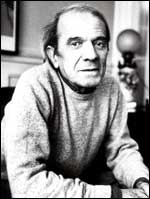It’s not enough to say that I am masochistic, and popists sadistic. That would be good, but it’s not true
Thu. July 29, 2004Categories: Abstract Dynamics
 |  |
Warning: theory haytaz will not derive much pleasure from this post.
As an oblique way of dealing with some of the questions raised by the Popist/ papist discussion, I offer this quote from Deleuze (from the notes on Foucault I linked to before).
(btw I’m not sure that I’d want to categorise myself as an ‘anti-popist’ [whereas I obviously sign up to anti-rockism no quesitons asked].)
Nevertheless, what Deleuze says here highlights some of my difficulties with (what I take to be) popism. In a sense, this is rehearsing the old plaisir/ jouissance riff with which Simon did so much in Blissed Out. But maybe Deleuze can offer a bit more.
Deleuze and Guattari saw their attempt to give desire a purely positive sense (D/G desire is not aspirational; it doesn’t ‘want’ anything it doesn’t already have) as perhaps their most important theoretical move. While I often wonder whether the term ‘desire’ can ever shake the connotations of lack that D/G so assiduously seek to remove from it, I nevertheless think that what they meant by ‘desire – a state beyond both pleasure and lack – is absolutely crucial.
Any way, over to Deleuze:
‘I cannot give any positive value to pleasure, because pleasure seems to me to interrupt the immanent process of desire; pleasure seems to me to be on the side of strata and organisation; and it is in the same movement that desire is presented as internally submitted to law and externally interrupted by pleasures; in the two cases, there is negation of a field of immanence proper to desire. I tell myself that it is no accident if Michel attaches a certain importance to Sade, and myself on the contrary to Masoch. It’s not enough to say that I am masochistic, and Michel sadistic. That would be good, but it’s not true. What interests me in Masoch is not the pain, but the idea that pleasure comes to interrupt the positivity of desire and the constitution of its field of immanence (as also, or rather in another way, in courtly love – constitution of a field of immanence or of a body without organs where desire lacks nothing, and guards itself as much as possible from the pleasures which would come and interrupt its process). Pleasure seems to me to be the only means for a person or a subject to “find themselves again” in a process which overwhelms them. It is a re-territorialisation. And from my point of view, it is in the same way that desire is related to the law of lack and the norm of pleasure.’
 |  |
but then again…
“Deleuze and Guattari speak of the nomad who does not wish to have control or stability – “a warrior without a strategy.’ This is a way of being, using the power of language, breaking free of discourse, living in the now. Every aspect of the environment is of equal value, no place, time or setting are privileged. The nomadic supervisor is engaged with the supervisee and always becoming, with a line of flight ever open, of ‘choices and chances, commission and omission, opportunities taken and missed.'”
Two questions raise themselves in my mind:
1. What if the whole of nomadotology comes into being as means of a flight from the unbearable?
2. What if the nomadic supervisor and supervisee change places (it’s a common tactic in psychotherapy)?
Mark did you know that there’s a Swedish pop group called Bodies Without Organs, formed by one of the guys behind Army Of Lovers? Europop luvs Deleuze.
Yes, I did… Haven’t heard them thought!!! Are they any good?
No idea, sorry. I’ll try and snaffle some off a P2P over the weekend though.
I have seen them mentioned approvingly on a blog somewhere — maybe popjustice?
Marcello, where’s that quote from, it doesn’t sound too reliable a source to me….
…from an essay I wrote in 1984…
I’m not sure what you mean by a ‘nomadic supervisor’ — who or what are they supervising?
I didn’t think nomads would, by definition, need a supervisor…oh dammit, it was 20 years ago, I was probably listening to Ocean Rain at the time or summat.
I love you, Marcello. Quote yourself unattributed more! Awesome.
Anyway, well done here to a certain extent, especially in clarifying their definition of desire/pleasure, its place in the discourse, etc. However, it doesn’t change the fact that the quote is stinky bullplop. (or, as the french say, c’est retardo.) The problem here is that he assigns a value judgment here that makes basically no sense for anyone besides himself. Theory to me seems like it should have at least some broad application, otherwise it’s just a “theory of me,” which is sort of interesting, but not really. I mean, not liking pleasure AT ALL? OK, I’m with him in that sometimes the anticipation is better than the fulfillment, i.e. sex, birthdays, etc. But man, that first bite of steak is waaaaay better than the anticipation of it. Pleasure is a pretty basic biological function that you can’t really argue yourself out of. Stretching causes endorphins to rush to your brain, and mm, pleasure.
Again, this may be true for him–I know lots of social misfits who have unusual reactions to basic stimuli. (My friend Steve, for instance, falls asleep upon injesting caffiene, and certainly there are people who don’t particularly enjoy sex and so the phsychological thrill of the seduction is better.) But this doesn’t create a very firm basis for theory. I’m not denying that by writing it in a convincing way he may have CREATED this reaction in some of his readers, and I’m not denying that this isn’t interesting, but it doesn’t make it any kind of true, and it’s certainly not generalizable to the more intersting to me group of “people who do not agree with D/G.” In other words, this particular reaction only seems plausible to me if you’re a freak or a Deleuze fan.
Well, I think you’re avoiding all the questions that Deleuze is posing here: to wit, you’re already assuming what is the very matter at issue (i.e. that the question ‘what is pleasure?’ is answered) — you think, pleasure = any ‘nice’ sensation. Deleuze is certainly NOT suggesting that the anticipation is better than the satisfaction; actually, it’s the whole temporality of that anticipation-satisfaction circuitry (whose pathos is so well sketched by Lacan) which is what D/G seek to move beyond with the concept of a plateau. Pleasure is a pretty basic biological function that you can’t really argue yourself out of. No, you can’t ARGUE your way out of it, but you can engage in practices which sidestep, deprivilege or avoid it.
Another way of attacking this is Freud. Freud said that pleasure is simply that tendency of the organism to return to what has previously produced feelings of satisfaction in it. Thus pleasure is inherently conservative, disliking novelty and selecting for the already constituted.
As for freaks and Deleuze fans; it could be argued that to be a genuine Deleuzian you have to be a ‘freak’ (which is why so few ‘Deleuzian’ philosophers are very Deleuzian). For myself, I like Deleuze BECAUSE of passages like that; I don’t ‘believe’ passages like that because I like Deleuze.
Well, I can’t resist the pop/Deleuze combo…
I really don’t think popism v antipopism line up with Deleuzean desire v pleasure the way you want them to. I mean, doesn’t the “immanent process of desire” describe an obsessive relation with pop as well as anything else? The charts are at least some kind of flow, aren’t they?
Anyway, I think ultimately Deleuze (well, if he hadn’t hated all pop music) would have completely refused the terms of the opposition. If anti-popism is based on a certain way of producing particular intensities, there’s no ground for assuming the same intensities can’t be cultivated through pop fandom (relations being external to their terms, etc.) I mean, surely the worst you could say would be along the lines of the bit in the BwO plateau where they’re talking about masochism and say something like “well obviously it’s not the best way you could make a BwO, but as long as it works for you…” (v. badly paraphrased).
Thanks Sandy… Haven’t seen you here before… think I’m right in saying this is yr first comment …any way, welcome…
I really don’t think popism v antipopism line up with Deleuzean desire v pleasure the way you want them to. I mean, doesn’t the “immanent process of desire” describe an obsessive relation with pop as well as anything else?
If I may so, I think you have misunderstood my objection to popism. I must reiterate that I’m not anti-popist; I simply think that popism is not sufficient. ‘Pop’ as the object of adoration is not the problem as I see it. It is what pop is used for that is the issue. For popists, aestheticist and consumerist criteria are enough: for them – I’m simplifying massively, but not, I think, misleadingly – ‘this is a good tune’.
Deleuze (well, if he hadn’t hated all pop music)
Well, he was French, you can’t expect too much.
would have completely refused the terms of the opposition
as you set it up yeh, but, after all, the desire/ pleasure opposition is HIS. my pt was not anti-pop, you can be pro-pop and anti-popist. In fact you make my point for me, coz as long as the issue is ‘producing intensities/ making a BwO’ and not appreciating a good tune, then we’ve moved beyond popism.
In fact you make my point for me, coz as long as the issue is ‘producing intensities/making a BwO’ and not appreciating a good tune, then we’ve moved beyond popism.
I’m really not convinced here – surely there are possibilities for all kinds of crazy becomings to go on around and through an ostensibly simple good-tune-appreciation logic. I guess it seems to me that even if popists claim “aestheticist and consumerist” criteria are all that matter (btw, I am unclear on distinction between ‘aestheticist’ and ‘aesthetic’, if there is one), there are, as I think you’re implying, intensities in pop that can’t be reduced to any set of stratic categories (when you first hear something as unexpected – these are personal examples – as ‘Yeah!’ or Britney’s ‘(I got that) Boom boom’. I mean, if courtly love can be a way to produce a BwO why can’t rhetorically straightforward popism?
(And yeah, that was my first comment, thanks for welcome…)
I see what you mean, and I’m perfectly happy to accept what yr saying, really. But that’s because your putting a wedge between what might happen when a popist listens to pop and their account of their own pleasure (it’s this ACCOUNT that I take to be popism).
Aestheticism is an orientation towards aesthetics; i.e. what mattters is aesthetics (as OPPOSED to, say, making a BwO)…